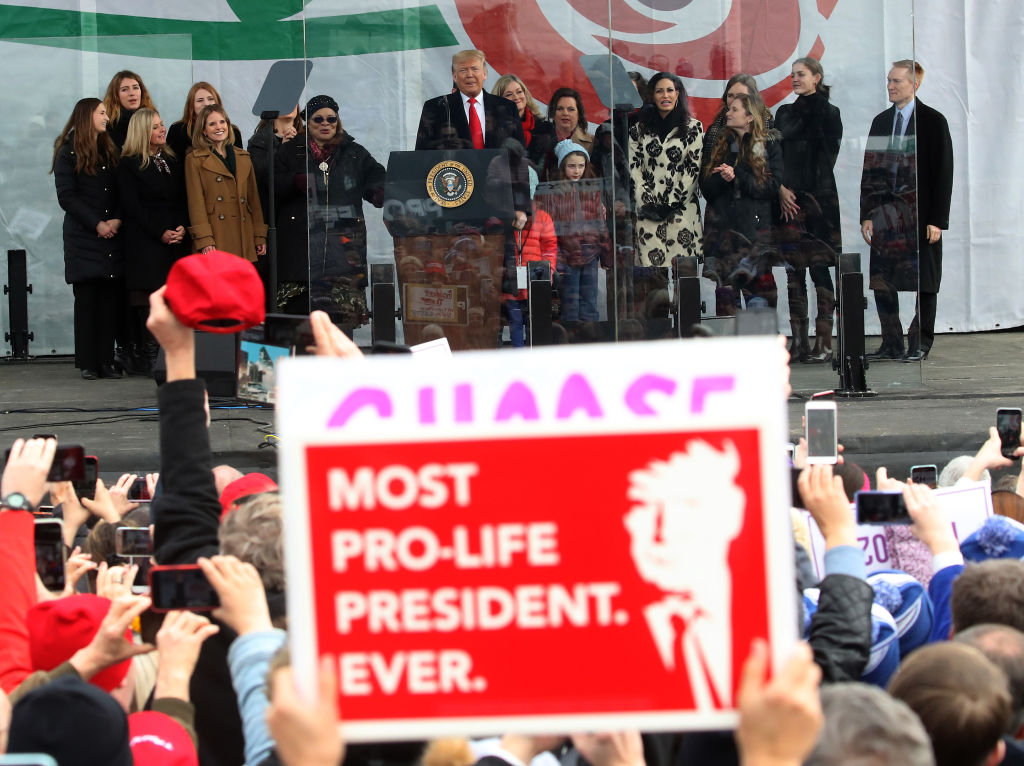
This article is part of The D.C. Brief, TIME’s politics newsletter. Sign up here to get stories like this sent to your inbox.
It was a moment some on the right had long suspected would come but many rank-and-file members refused to admit was possible: their champion against abortion rights, Donald Trump, would go wobbly.
The former—and perhaps future—President this week declined to endorse a federal ban on abortion. Instead, the presumptive Republican nominee said it should remain up to the states to negotiate an inconsistent landscape when it comes to when pregnancies can be terminated. The New York mogul notably didn’t back a federal 15-week ban on abortions, which GOP leaders like Sen. Lindsey Graham and Trump’s former counselor Kellyanne Conway support, showing that Trump’s dominance over the GOP does not always translate to an easy marriage of ideas or ideology. (As President, Trump supported a 20-week federal ban, although his hard lines on abortion rights were incredibly fluid.)
The rage from his anti-abortion base came immediately, but it’s not entirely clear if there will be any electoral consequences for Trump. There is no conservative alternative to his candidacy, and President Joe Biden has made restoring the federal right to an abortion protected for a half century via Roe v. Wade a campaign promise.
Put simply: Trump shifted his position in a way that will anger his right flank that has nowhere else to go and could soften Democrats’ grip on the female vote. The move may be as insincere as it is smart.
Conservative lawmakers and leaders alike were hardly shy about their frustrations.
"I respectfully disagree with President Trump’s statement that abortion is a states’ rights issue," said Graham, a South Carolina perma-apologist for Trumpism. “I will continue to advocate that there should be a national minimum standard limiting abortion at [15] weeks because the child is capable of feeling pain, with exceptions for rape, incest[,] and life of the mother.”
Responded Trump: "Many Good Republicans lost Elections because of this Issue, and people like Lindsey Graham, that are unrelenting, are handing Democrats their dream of the House, Senate, and perhaps even the Presidency.” As is his nature, Trump didn’t show any sign of contrition. If anything, he actually revealed something more significant: he made it clear his choice was about politics, not principles.
Conservatives have made this bargain with Trump before. In 2015, he basically promised religious leaders that he would outsource his nominations for judges to conservatives who have spent a generation preparing for the end of Roe. In turn, religious leaders—especially when it became apparent Trump was heading toward the Republican nomination—rallied behind the thrice-married alleged adulterer who in the weeks before the 2016 votes were cast allegedly used a fixer to pay off a porn star.
Former Vice President Mike Pence, a devout Christian who joined the Trump campaign as its fig leaf to the religious bloc of voters, expressed frustration with Trump’s new position this week. “However much our Republican nominee or other candidates seek to marginalize the cause of life, I know pro-life Americans will never relent until we see the sanctity of life restored to the center of American law in every state in this country,” he said.
And Susan B. Anthony Pro-Life America, the anti-abortion rights group that advised many in the Trump orbit over the years, similarly slammed the switch. Its leader, Marjorie Dannenfelser, blamed Trump’s consultants for missing the party’s base. But SBA Pro-Life America nonetheless repeated its pledge to help Republicans retake power, joining other groups like Students for Life, the Faith and Freedom Coalition, the Family Research Council, National Right to Life, and CatholicVote.
While there can be some sincere outrage over Trump’s callous flip-flop in an election year, most of the feigned shock is for show. As one friend—former TIME correspondent Elizabeth Dias—wrote in 2016, religious conservatives made their bet: Trump would be a vessel for their ambitions. (Dias and another former campaign trail pal of mine, Lisa Lerer, will unpack all of this in their new book out in June about the fall of Roe from their perches in The New York Times’ Washington bureau.)
It is important to be honest right now. Conservatives, especially in the self-described pro-life wing of politics, have always known Trump was using them just as much as they were playing with him. It was an unnatural alliance between a playboy and pastors, but it served their needs to give Trump power. Now, firmly atop that MAGA machine, Trump does not need the anti-abortion activists as much. He can take them—and their votes and dollars—for granted because he knows this truth: Where else are they going to go? It may be crass, but Trump is reading the battlefield accurately.
Make sense of what matters in Washington. Sign up for the D.C. Brief newsletter.
More Must-Reads From TIME
- The 100 Most Influential People of 2024
- Coco Gauff Is Playing for Herself Now
- Scenes From Pro-Palestinian Encampments Across U.S. Universities
- 6 Compliments That Land Every Time
- If You're Dating Right Now , You're Brave: Column
- The AI That Could Heal a Divided Internet
- Fallout Is a Brilliant Model for the Future of Video Game Adaptations
- Want Weekly Recs on What to Watch, Read, and More? Sign Up for Worth Your Time
Write to Philip Elliott at philip.elliott@time.com